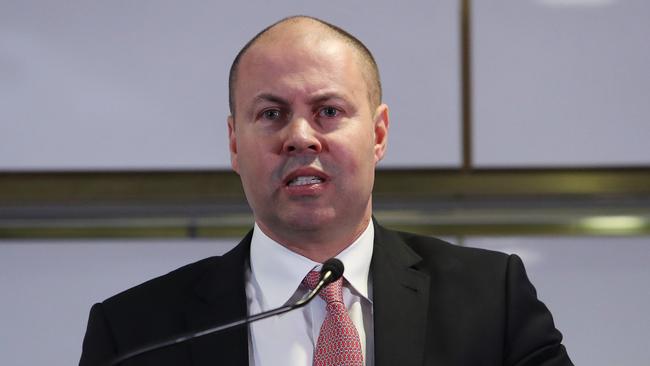IMF forecasts global growth at decade low
The International Monetary Fund has slashed its global growth outlook to the lowest in a decade and downgraded its forecasts for Australia.

The International Monetary Fund has slashed its global growth outlook to the lowest in a decade and downgraded its forecasts for Australia, as it backed in the Reserve Bank’s move to cut interest rates to record levels.
The release on Tuesday of the minutes for the RBA’s meeting this month showed the board was prepared to ease monetary policy further if needed, to support growth and job creation.
The IMF’s World Economic Outlook cut its growth forecast for the Australian economy from 2.1 per cent to 1.7 per cent — a level below the government’s and the Reserve Bank’s forecasts of about 2.25 per cent.
MORE: Rate cuts pique housing interest | Surplus safe with fast-tracked tax cuts, new study says | Graham Richardson says stormy waters on the horizon threaten Scott Morrison’s smooth sailing | Editorial — As a group, the banks should be match fit for the regulatory blowtorch
The downgrade in Australia’s growth forecast was twice the global downgrade, as the IMF called on governments to loosen their purse strings to bolster their flailing economies.
Gita Gopinath, the director of the IMF’s research department, said the global economy was in a “synchronised slowdown”. The global growth forecast was reduced from 3.2 per cent to 3 per cent since July.
“We are, once again, downgrading growth for 2019 to 3 per cent,” Ms Gopinath said. “At 3 per cent growth, there is no room for policy mistakes and an urgent need for policymakers to co-operatively de-escalate trade and geopolitical tensions.”
The IMF said global trade growth had dropped to 1 per cent — the slowest in seven years — as the US-China trade row and “increasing geopolitical tensions” took their toll on manufacturers and service sectors.
Josh Frydenberg stressed that the economy “remained sound” and pointed to strong jobs growth, the government’s AAA credit rating and the “lowest level of welfare dependency in three decades”.
“While Germany, the United Kingdom, Singapore and other economies experienced negative economic growth in the June quarter, the Australian economy remains resilient and continues to grow,” the Treasurer said.
In question time, Scott Morrison said more people were employed as a share of Australia’s total population than at any other time in the nation’s history.
“We’re investing in the infrastructure that Australia needs to grow,” the Prime Minister said.
He pointed out that the economy was still growing faster than all G7 nations excluding the US.
The IMF estimated that the US-China trade war would shave 0.8 percentage points off global growth over the next two years as a result of higher tariff barriers and prolonged policy uncertainty.
It welcomed steps to “de-escalate tensions and roll back recent trade measures”, following moves by Donald Trump and Xi Jinping to rekindle negotiations to resolve the escalating trade war.
The IMF also appeared to endorse the Reserve Bank’s controversial series of cuts in the official cash rate since June to a record low of 0.75 per cent.
“Major central banks have appropriately eased to reduce downside risks to growth and to prevent de-anchoring of inflation expectations,” the IMF said.
The minutes for the RBA’s meeting on October 1 stated that “the board could reduce the likelihood of a negative shock leading to outcomes that materially undershot the bank’s goals by strengthening the starting point for the economy”.
The IMF said fiscal policy could “play a more active role”.
“Monetary policy cannot be the only game in town,” it said. “It should be coupled with fiscal support where fiscal space is available, and policy is not already too expansionary.”
The RBA rate cuts and a drip feed of weaker-than-expected economic data have prompted calls for a reassessment of the federal government’s fiscal policy, which anticipates a budget surplus this year.
Labor Treasury spokesman Jim Chalmers highlighted the fact the IMF’s 0.4-percentage-point downgrade for the Australian economy since April was larger than the downgrade to global growth and four times as large as those for the euro area and advanced economies as a whole.
“The IMF’s updated forecasts make a mockery of Josh Frydenberg’s claims that the Morrison government has the right policy settings,” Dr Chalmers said.
He called on the government to bring forward its mid-year budget update to “outline an economic plan that supports the floundering economy”.
The IMF said heightened trade and geopolitical tensions, including “Brexit-related risks”, could further disrupt economic activity, and “derail an already fragile recovery in emerging market economies and the euro area”.
“This could lead to an abrupt shift in risk sentiment, financial disruptions, and a reversal in capital flows to emerging market economies,” it said. “In advanced economies, low inflation could become entrenched and constrain monetary policy space further into the future, limiting its effectiveness.”
The IMF release increased the likelihood that the RBA will downgrade its forecast for 2019 growth from 2.5 per cent when it releases its next quarterly economic update in November.
Treasury’s most recent April forecast of 2.75 per cent growth for this financial year is likely to decline at the next budget update, expected in December.
Mr Frydenberg said the international challenges were a “stark reminder of why we must stick to our economic plan, which will deliver lower taxes so Australians can keep more of what they earn, more infrastructure to create jobs and boost productivity”.
He said that returning the budget to surplus would help the government “meet the challenges that lie ahead”.





To join the conversation, please log in. Don't have an account? Register
Join the conversation, you are commenting as Logout